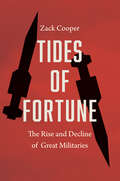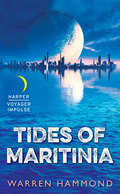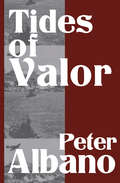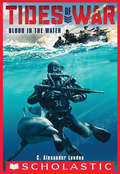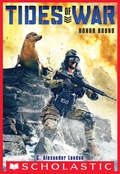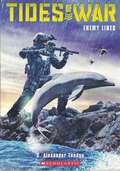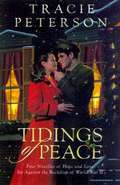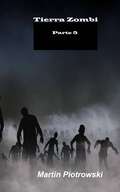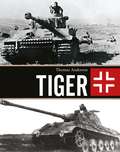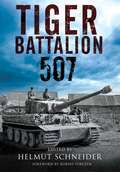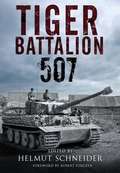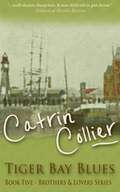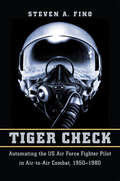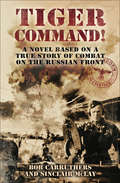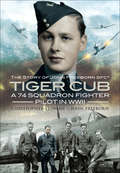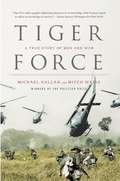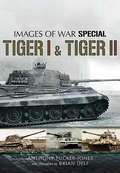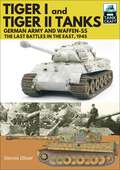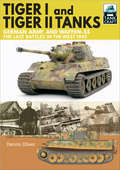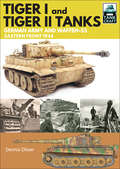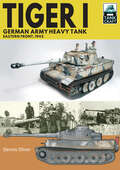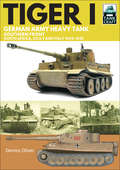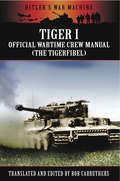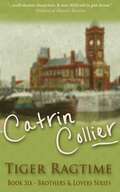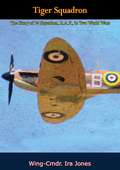- Table View
- List View
Tides of Fortune: The Rise and Decline of Great Militaries
by Zack CooperAn ambitious look at how the twentieth century&’s great powers devised their military strategies and what their implications mean for military competition between the United States and China How will the United States and China evolve militarily in the years ahead? Many experts believe the answer to this question is largely unknowable. But Zack Cooper argues that the American and Chinese militaries are following a well-trodden path. For centuries, the world&’s most powerful militaries have adhered to a remarkably consistent pattern of behavior, determined largely by their leaders&’ perceptions of relative power shifts. By uncovering these trends, this book places the evolving military competition between the United States and China in historical context. Drawing on a decade of research and on his experience at the White House and the Pentagon, Cooper outlines a novel explanation for how militaries change as they rise and decline. Tides of Fortune examines the paths of six great powers of the twentieth century, tracking how national leaders adjusted their defense objectives, strategies, and investments in response to perceived shifts in relative power. All these militaries followed a common pattern, and their experiences shed new light on both China&’s recent military modernization and America&’s potential responses.
Tides of Maritinia
by Warren HammondMaritinia is at the far edge of the Empire, a planet with little economic value in the Sire's sphere of influence. And it's just rebelled.The people of Maritinia believe the Empire will not care that they've broken free. But the Empire is built on the belief that if an insignificant planet can revolt, then other, more important planets might follow suit.So the Empire sends an agent to Maritinia with a mission: assassinate and replace one of the conspirators, and do enough to sow discord that when the soldiers do land, any opposition will be quickly crushed.Thus Jakob finds himself immersed in the inner circle of the madman who led the rebellion. A raw recruit with only his political officer--a separate consciousness inserted into his brain--to speak with, Jakob is out of his element as an operative. And while he falls deeper into the conspiracy, he begins to question everything: the despotic admiral in charge of the coup, his feelings for a native woman, and--most troublingly--whether he still agrees with the will of the Sire.
Tides of Valor
by Peter AlbanoRodney and Nathan Higgins are of the same blood, but they are destined to lead two very different lives. Rodney loves the life his father had worked for, living on New York&’s Fifth Avenue in all the luxury that comes with it. Nathan is a Marxist radical, opposed to all that is his brother. Rodney, following in his father&’s footsteps and defending his country on the sea, sails the Pacific for revenge on the Japanese after Pearl Harbor. Nathan, pushed into the war at the last minute, finds himself in North Africa, an able killer. Both brothers must fight for their lives, their beliefs, and for glory in Tides of Valor.
Tides of War #1: Blood in the Water (Tides of War #1)
by C. Alexander LondonBased on a real military program! The US Navy's new breed of soldier is ready to make a big splash. From the author of Dog Tags! Navy SEALs are some of the most elite warriors in the world. Trained to operate in sea, land, and air, they work under cover of night to carry out the US military's most sensitive and difficult missions. Cory McNab wanted to be a Navy SEAL, but he washed out of the program. Now he is a member of the Navy's Marine Mammals Program, where he is partnered with a search-and-recovery dolphin named Kaj. Together, Cory and Kaj are the Navy's best hope when a US spy submarine is lost in enemy waters. With the help of Kaj's bio-sonar, they should be able to locate the submarine before its secrets fall into the wrong hands. But the mission gets complicated when a team of Navy SEALs runs into trouble. Can Cory succeed where his heroes have failed . . . or is he in too deep?
Tides of War #2: Honor Bound (Tides of War #2)
by C. Alexander LondonBased on a real military program! The US Navy's new breed of soldier is ready to make a big splash. An action-packed, maritime military adventure from the author of Dog Tags. A notorious Somalian pirate sails the Arabian Sea, leading a band of deadly thieves and mercenaries on an international crime spree. When they take American hostages aboard a cargo ship, they've finally gone too far -- and a special task force of Navy SEALs and Marines is called in to help. SEALs, Marines . . . and a talented sea lion named Sly. As Sly's handler, young sailor Felix has two important jobs. Job one is to get Sly to plant a beacon so that the U.S. strike force can follow the pirates back to their haven. Job two is to keep the sea lion safe and out of combat. But when the mission goes wrong and the pirates get the upper hand, Felix and Sly end up right in the middle of the action . . . with dozens of innocent lives at stake.
Tides of War #3: Enemy Lines
by C. Alexander LondonCory McNab is a proud member of the US Navy's Marine Mammal Program. Along with his dolphin partner, Kaj, he teaches new recruits how to work with their dolphins to locate underwater explosives, intercept enemy swimmers, and otherwise keep America safe. When an elite squad of Navy SEALs deploys to the Black Sea, they need the assistance of every dolphin in Cory's top secret Mark Sixty team. With countless lives at stake, a special task force of SEALs, dolphins, and handlers sets out under cover of night in a desperate effort to stop a war before it starts. But Cory and Kaj soon discover that they're in over their heads. Because the Russian military has a Marine Mammal Program of its own. And their dolphins have been trained... to kill.
Tidings Of Peace
by Tracie PetersonComing Home David receives a hero's welcome from the family of a friend lost at Pearl Harbor. Hope and truth abound in their home and in the eyes of a young woman who sees only a hero in need of grace. Remember Me Stationed in the dangerous South Pacific, Erik Anderson fears the fiancee he left behind may have found someone new. Can a childhood dth--and a long-sought love-be renewed when his very survival is at stake? Shadow of His Wings While her husband, Collin, battles in the air over Europe, Melody Thompson must welcome their child into the world on her own. Scorned by her family, Melody longs to find forgiveness and face the future before her.... Parachutes and Lace Clara Campbell is thrilled to be working with the Red Cross in England until she discovers that her beloved Michael is to be shipped out within hours. With images of a "proper wedding" dancing through her head, will Clara's dreams disguise what matters most?
Tierra Zombi: Parte 5
by Martin Piotrowski¿Quieren vivir o morir? Si quieren vivir, escuchen lo que les digo y ¡hagan exactamente lo que les digo! Examino el rifle y la pistola. Charly y Lisa lloran en silencio mientras los zombis golpean la puerta. Desesperada, Charly me mira. “Los… ¡Los zombis son malos!”. Veo su rostro pálido. “¡Los humanos son peores!”. Les explico a ambas chicas mi plan. Los muertos vivientes empujan la puerta como locos. Luego la puerta se abre de golpe. Los zombis chillan y se lanzan sobre nosotras… ¿Clarisse Stevens sobrevivirá? En un mundo dominado por zombis y bandidos, Clarisse solo tiene dos opciones: superarse a sí misma o morir.... Las emocionantes aventuras de la pequeña heroína pelirroja en Boulder, Colorado continúan con la quinta parte de la saga “Tierra Zombi”…
Tiger
by Thomas AndersonOne of the most feared weapons of World War II, the Tiger tank was a beast of a machine which dominated the battlefields of Europe with its astonishing size, speed and firepower. Today it continues to fascinate more than 70 years after it was first designed and a comprehensive, illustrated history such as this is long overdue. Revealing its design and development history, Thomas Anderson draws upon original German archival material to tell the story of the birth of the Tiger. He then analyzes its success on the battlefield and the many modifications and variants that also came into play. Illustrated throughout with rare photographs and drawings, many of which have never been published in English before, this is a unique history of easily the most famous tank ever produced.
Tiger Battalion 507: Eyewitness Accounts from Hitler's Regiment
by Helmut Schneider‘May the army of millions of dead of all nations bear witness to humanity for the hope that future generations may learn to discard war as the best way to resolve their differences.’ - Helmut Schneider This is the little-known story of Heavy Panzer (Tiger) Battalion 507 told through the recollections of the men who fought with the unit. The book was conceived during a reunion of the ‘507’ at Rohrdorf in 1982, where it was agreed to set up an editorial committee under Helmut Schneider, himself a veteran of the battalion, to search for as many survivors of the unit as possible and gather their reminiscences. The resulting account is a treasure trove of first-hand material, from personal memories, diary entries and letters to leave passes, wartime newspaper cuttings, Wehrmacht bulletins and more than 160 photographs. The account follows the unit from its formation in 1943 and the catastrophic events on the Eastern Front, through battles on the Western Front and engagements against the American 3rd Armoured Division to the confusion of retreat, panic-stricken eight and Soviet captivity in the closing stages of the war. Honest and unflinching, this remarkable collection of autobiographies offers a glimpse into life in Hitler’s panzer division and is a stark testimony of a generation that sacrificed its best years to the war. This is the first English-language translation of the work.
Tiger Battalion 507: Eyewitness Accounts from Hitler's Regiment
by Helmut Schneider and Robert ForczykA personal history of a Nazi battalion’s experiences on the Eastern and Western fronts of WWII, told through the vivid accounts of the soldiers themselves. This is the little-known story of Heavy Panzer (Tiger) Battalion 507. Helmut Schneider, himself a veteran of the battalion, sought out as many survivors of the unit as possible and gather their reminiscences. The resulting account is a treasure trove of first-hand material, including personal memories, diaries, letters, leave passes, wartime newspaper cuttings, Wehrmacht bulletins, and more than 160 photographs. The account follows the unit from its formation in 1943 to the catastrophic events on the Eastern Front and battles on the Western Front. It describes engagements against the American 3rd Armored Division, the confusion and panic of retreat, and Soviet captivity in the closing stages of the war. Honest and unflinching, this collection of autobiographies offers a glimpse into life in Hitler’s panzer division.
Tiger Bay Blues
by Catrin CollierA Short Ghost Story by best-selling author Catrin Collier Kitty had never thought she'd escape the shadow of the workhouse or her mother's shame until she met Ellis. He gave her more than she'd ever dreamed could be hers - a real home and more love than she'd imagined existed in the world. Until war came even to their quiet farm and blighted their lives. Once again she knew loneliness - until the night Ellis returned. But was he Ellis? And who was the sick, whining stranger in the wheelchair, always moaning, never silent who threatened to destroy their lives . . .
Tiger Check: Automating the US Air Force Fighter Pilot in Air-to-Air Combat, 1950–1980
by Steven A. FinoHow did American fighter pilots respond to the challenges posed by increasing automation?Spurred by their commanders during the Korean War to be "tigers," aggressive and tenacious American fighter pilots charged headlong into packs of fireball-spewing enemy MiGs, relying on their keen eyesight, piloting finesse, and steady trigger fingers to achieve victory. But by the 1980s, American fighter pilots vanquished their foes by focusing on a four-inch-square cockpit display, manipulating electromagnetic waves, and launching rocket-propelled guided missiles from miles away. In this new era of automated, long-range air combat, can fighter pilots still be considered tigers? Aimed at scholars of technology and airpower aficionados alike, Steven A. Fino’s Tiger Check offers a detailed study of air-to-air combat focusing on three of the US Air Force’s most famed aircraft: the F-86E Sabre, the F-4C Phantom II, and the F-15A Eagle. Fino argues that increasing fire control automation altered what fighter pilots actually did during air-to-air combat. Drawing on an array of sources, as well as his own decade of experience as an F-15C fighter pilot, Fino unpacks not just the technological black box of fighter fire control equipment, but also fighter pilots’ attitudes toward their profession and their evolving aircraft. He describes how pilots grappled with the new technologies, acutely aware that the very systems that promised to simplify their jobs while increasing their lethality in the air also threatened to rob them of the quintessential—albeit mythic—fighter pilot experience. Finally, Fino explains that these new systems often required new, unique skills that took time for the pilots to identify and then develop. Eschewing the typical "great machine" or "great pilot" perspectives that dominate aviation historiography, Tiger Check provides a richer perspective on humans and machines working and evolving together in the air. The book illuminates the complex interactions between human and machine that accompany advancing automation in the workplace.
Tiger Command!: A Novel Based on a True Story of Combat on the Russian Front
by Bob Carruthers Sinclair McLayGerman and Russian tank battalions clash in this action-packed novel of WWII combat and conspiracy cowritten by an Emmy Award–winning historian. When Germany&’s leading tank ace meets Russia&’s Steppe Fox it&’s a fight to the death. Faced with overwhelming odds, Kampfgruppe Hans von Schroif needs a better armored vehicle and fast, but the new Tiger tank is still on the drawing board. Now, von Schroif must overcome bureaucracy, espionage, and relentless Allied bombing to get the Tiger into battle in time to meet the ultimate challenge. Based on a true story of combat on the Russian Front, Bob Carruthers and Sinclair McLay&’s Tiger Command! presents the gripping saga of how Germany&’s Tiger tank was born and a legend was forged in the heat of combat. Gritty, intense, and breath-taking in its detail, this sprawling epic captures the reality of the lives and deaths of the tank crews who fought for survival on the Eastern Front. &“Carruthers has a masterful grasp of the realities of the conflict.&” —John Erickson, author of The Road to Stalingrad: Stalin&’s War with Germany
Tiger Cub: A 74 Squadron Fighter Pilot in WWII: The Story of John Freeborn DFC*
by John Freeborn Chris YeomanThe stirring biography of the RAF flying ace, one of the great pilots of the Battle of Britain, and the famous squadron that catapulted him into history. Acting Pilot Officer John Freeborn reported to RAF Hornchurch on 29 October, 1938. John was posted from Flying Training School to join the already acclaimed 74 &“Tiger&” Squadron at eighteen years of age. At that time the Squadron was equipped with the Gloster Gauntlet. One of the first people John met when he arrived at the station was Bob Stanford Tuck of 65 squadron. On first meeting South African fighter ace Adolf &“Sailor&” Malan, John thought he seemed nice enough and soon learned that he was a determined leader, a fine flyer and an aggressive fighter pilot. &“He was definitely the best shot there was,&” John recalls. &“Without question Malan was a brilliant marksman, but I could out fly him and I bloody told him so too." John flew many operations with 74 Squadron in Spitfires during the early years of the war and the Battle of Britain; he was awarded the DFC for his efforts. During a brief respite for 74, John Freeborn was promoted to Flight Lieutenant and on 29 August he was given command of A Flight. In 1941, the first couple of months saw 74 Squadron conducting fighter Sweeps and Circus sorties over the French coast. On 17 February 1941, John Freeborn learned that he had been awarded a bar to his DFC. At that time, he had destroyed twelve enemy aircraft and damaged many more. In 1946 John Connell Freeborn DFC and Bar left the Royal Air Force with honor and distinction.
Tiger Force: A True Story of Men and War
by Michael Sallah Mitch WeissIn a story sadly relevant to other wars past and present, Pulitzer Prize-winning investigative reporters chronicle the long covered-up tale of a short-lived (May-November 1967) experimental Army unit in the Vietnam War, whose mission it was to seek out the enemy for better-targeted bombing runs. The book includes maps of the Tiger Force operations area, a cast of characters, several photos, and the gory details of the Force's descent into being barbarous killers of civilians. Sallah is now an editor for the Miami Herald; Weiss is with the Charlotte Observer. Annotation ©2006 Book News, Inc., Portland, OR (booknews.com)
Tiger I & Tiger II: Tiger I And Tiger Ii (Images of War Special)
by Anthony Tucker-JonesA pictorial history and analysis of the infamous World War II German tanks. The German Tiger I and Tiger II (known to the Allies as the King Tiger or Royal Tiger) were the most famous and formidable heavy tanks of the Second World War. In their day, their awesome reputation inspired such apprehension among Allied soldiers that the weaknesses of these brilliant but flawed designs tended to be overlooked. Anthony Tucker-Jones, in this illustrated history, tells the story of their conception and development and reconsiders their operational history, and he dispels the myths that have grown up around them. The Tigers were over-engineered, required raw materials that were in short supply, and were time-consuming to manufacture and difficult to recover from the battlefield. Only around 1,300 of the Tiger I and fewer than 500 of the Tiger II were produced, so they were never going to make anything more than a local impact on the outcome of the fighting on the Western and Eastern fronts. Yet the myth of the Tigers, with their 88mm guns, thick armor, and brutal profiles, has grown over time to the extent that they are regarded as the deadliest tanks of the Second World War. Anthony Tucker-Jones&’s expert account of these remarkable fighting vehicles is accompanied by a series of color plates showing the main variants of the designs and the common ancillary equipment and unit markings. His book is an essential work of reference for enthusiasts.
Tiger I and Tiger II Tanks: German Army and Waffen-SS The Last Battles in the East, 1945 (TankCraft)
by Dennis OliverBy the first weeks of 1945, the Eastern Front had been pushed back to the Carpathian mountain passes in the south and Warsaw on the Vistula River in the center, while in the north, the German army was fighting in East Prussia. The Wehrmacht's armored and mobile formations were now employed exclusively as fire brigades, rushed from one crisis to the next as the Red Army pushed inexorably westward. Critical to the German defense were the army's heavy Panzer battalions whose Tiger tanks, with their 8.8 cm guns, were almost invincible on the open plains of central Europe. In his latest book in the TankCraft series, Dennis Oliver uses archive photos and extensively researched color illustrations to examine the Tiger tanks and units of the German Army and Waffen-SS heavy Panzer battalions that struggled to resist the onslaught of Soviet armor during the last days of the conflict which culminated in the battle for Berlin. A key section of his book displays available model kits and aftermarket products, complemented by a gallery of beautifully constructed and painted models in various scales. Technical details as well as modifications introduced during production and in the field are also examined providing everything the modeler needs to recreate an accurate representation of these historic tanks.
Tiger I and Tiger II Tanks: German Army and Waffen-SS, The Last Battles in the West, 1945 (TankCraft #13)
by Dennis OliverAn in-depth overview of these fearsome heavy tanks, including photos, illustrations, and modeling information. Tiger tanks were among the most-feared fighting vehicles of the Second World War. They gained almost legendary status—yet they never fulfilled their potential, because they were not produced in sufficient numbers and the tide of the war had turned against the German army by the time they were introduced. Often they were deployed in difficult circumstances and in defensive battles, struggling against the odds. Nowhere was this truer than in western Europe during the Allied advance across France and into Germany, and it is the Tigers of this phase of the war that Dennis Oliver portrays in his third volume on the Tiger in the TankCraft series. Using archive photos and extensively researched color illustrations, he examines the Tiger tanks and units of the German Army and Waffen-SS heavy panzer battalions that struggled to resist the onslaught of Allied armor and air attacks during the last days of the conflict. A key section of his book displays available model kits and aftermarket products, complemented by a gallery of beautifully constructed and painted models in various scales. Technical details as well as modifications introduced during production and in the field are also examined, providing everything the modeler needs to recreate an accurate representation of these historic tanks.
Tiger I and Tiger II: German Army and Waffen-SS, Eastern Front 1944 (TankCraft #1)
by Dennis OliverA guide blending the history behind the two World War II German tanks with resources for military vehicle modeling enthusiasts. In spite of the relatively small numbers produced, the Tiger I and Tiger II tanks are arguably the most famous armored fighting vehicles of the Second World War. This book, the first in the TankCraft series, uses archive photos and extensively researched color illustrations to examine the tanks and units of the German Army and Waffen-SS heavy panzer battalions that attempted to hold back the Red Army during 1944. A large part of the book showcases available model kits and aftermarket products, complemented by a gallery of beautifully constructed and painted models in various scales. Technical details as well as modifications introduced during production and in the field are also examined providing everything the modeler needs to recreate an accurate representation of the tanks that fought from the snow-covered fields of Byelorussia and the Ukraine, through the Baltic States, and into Poland and Hungary.&“From a technical standpoint the book is a winner. Throw in all of the unit histories and then add the modelling, and it is a superb book on the Tiger I-II tanks. . . . The book is really a showcase of the [modelers] and their builds, and gives the rest of us a shot in the arm to up our game on our next Tiger tank.&” —A Wargamers Needful Things
Tiger I, German Army Heavy Tank: Eastern Front, 1942 (TankCraft)
by Dennis OliverThe Tiger I and Tiger II tanks are probably the most famous German armoured fighting vehicles of the Second World War and despite the relatively small numbers produced, the heavy Panzer units of the German Army played a key role in the battles fought in North Africa, Italy, the Western Front and particularly in the East. In the seventh and final book on the Tiger in this series Dennis Oliver examines the first tanks that left the production line to go into service on the Eastern Front in an effort to break the Russian defences around Leningrad. As reinforcements steadily arrived, the same units played an important part in the blunting of the Soviet offensive efforts and in the retaking of Kharkov in eastern Ukraine in early 1943, a tactical achievement that is studied in military academies around the world today. In addition to archive photographs and painstakingly researched, exquisitely presented color illustrations, a large part of this book showcases available model kits and aftermarket products, complemented by a gallery of beautifully constructed and painted models in various scales. Technical details as well as modifications introduced during production and in the field are also examined providing everything the modeller needs to recreate an accurate representation of the Tigers of 1942 and early 1943.
Tiger I: German Army Heavy Tank, Southern Front, North Africa, Sicily and Italy, 1942–1945 (Tankcraft Ser. #16)
by Dennis OliverWhen at Hitlers insistence the first Tiger I tanks went into action in Tunisia in December 1942 they rapidly gained a formidable fighting reputation despite their lack of reliability and the small number deployed. With its heavy armour and 88mm gun, it outclassed all the Allied tanks then in service and forced the Allies to accelerate the introduction of improved anti-tank guns and tanks that could match the Tiger in terms of firepower and protection.In this, his second volume in the TankCraft series on the Tiger, Dennis Oliver uses archive photos and extensively researched color illustrations to examine the Tiger tanks and German army units that first took them into combat in North Africa and then operated them as they fell back through Sicily and Italy between 1943 and 1945.A large part of the book showcases available model kits and aftermarket products, complemented by a gallery of beautifully constructed and painted models in various scales. Technical details as well as modifications introduced during production and in the field are also examined providing everything the modeller needs to recreate an accurate representation of the tanks that made such an immediate impact on the southern front during the Second World War.
Tiger I: The Official Wartime Crew Manual (Hitler's War Machine)
by Bob CarruthersThe original how-to manual for handling the German tank in World War II, edited and translated by the Emmy Award-winning historian and author. During the Second World War, Tiger tank crews had to be trained as quickly and effectively as possible. To assist in this process General Heinz Guderian authorized the publication of the Tigerfibel, the illustrated manual which was issued to Tiger I crews from 1943 onwards. This highly unorthodox publication was full of risqué drawings and humorous illustrations and was designed to convey complex battlefield instructions in a simple and memorable manner. This unique primary source has now been translated into English by Emmy Award-winning historian Bob Carruthers and published with a new overview and introduction. It makes for indispensable reading for anyone interested in tank warfare in World War II. The manual contains everything the reader could ever wish to know concerning how the crews were instructed to handle the Tiger I under combat conditions, including detailed instructions on aiming, firing, ammunition and close combat. There are extensive sections on maintenance, driving, radio operation and the essentials of commanding the heavy tank. This priceless information is now being made available to a wider English-speaking audience as an electronic publication for the first time. Fascinating and highly accessible, the Tigerfibel is essential and rewarding reading for all those interested in the history of this famous tank. This book is part of the Hitler&’s War Machine series which draws on primary sources and contemporary documents to provide a new insight into the true nature of Hitler&’s Wehrmacht.
Tiger Ragtime
by Catrin CollierA tale of love and hardship set in wild and beautiful 19th century Cornwall. Born into a once-respectable family, circumstances have reduced Roz Trevaskis to working at the local inn. In order to pay the fines incurred through her alcoholic mother's drunken behaviour, Roz has put herself in debt to some unpleasant people, and has reluctantly turned to smuggling. When her half-brother, Tom, is offered a job as an apprentice on the estate of the local JP, Branoc Casvellan, Roz realises this is an opportunity to dig her family out of trouble. Then Casvellan's brother catches smallpox, and it falls to Roz to nurse him - bringing her into close contact with her handsome employer. But how will Casvellan - and his family - react when the truth about Roz's life comes out?
Tiger Squadron: The Story of 74 Squadron, R.A.F., in Two World Wars
by Wing-Cmdr. Ira JonesFrom Ypres and Verdun to the Battle of Britain—here in the story of the brave men who destroyed Richthofen’s Flying Circus and hurled back Goering’s Luftwaffe to bring England through her darkest hours to shining victory…“An Extraordinary Book.”—Dally Mail“A gripping picture of air combat.”—PunchMEN OF GUTS AND GLORY—the flying, fighting Commanding Officer who bagged 74 enemy aircraft in World War I—the pilot who shot down five enemy aircraft and damaged three others in a single day’s flying—the invincible pilot without legs who engineered an incredibly daring prison escape…This is the story of the courageous men of the R.A.F., led by the Tiger Squadron, the greatest combat fliers in the annals of aviation. Men of indomitable bravery who turned the tides of two world wars.Told by one of its most brilliant members, Wing Commander Ira Jones, it is the authentic account of the men who risked their lives time and again to preserve freedom and destroy tyranny. It is the gripping story of heroic men in the grim battle for their lives and their country miles above the earth where the sky was the limit as they jousted with death and earned the most glorious praise a nation can bestow in Prime Minister Winston Churchill’s tribute: “Never in the field of human conflict was so much owed by so many to so few.”
